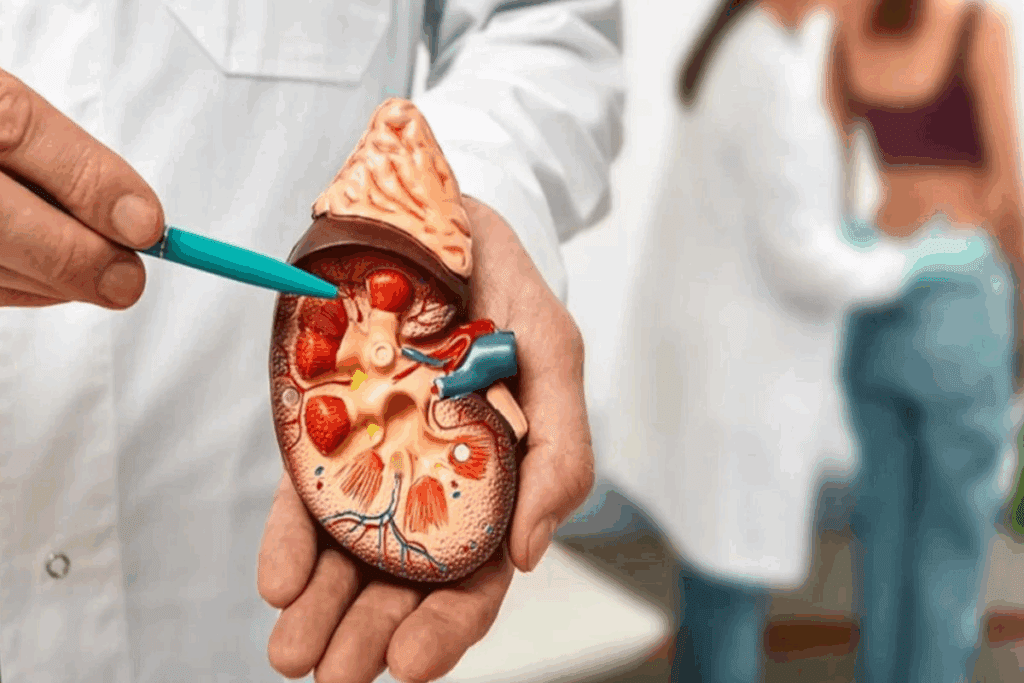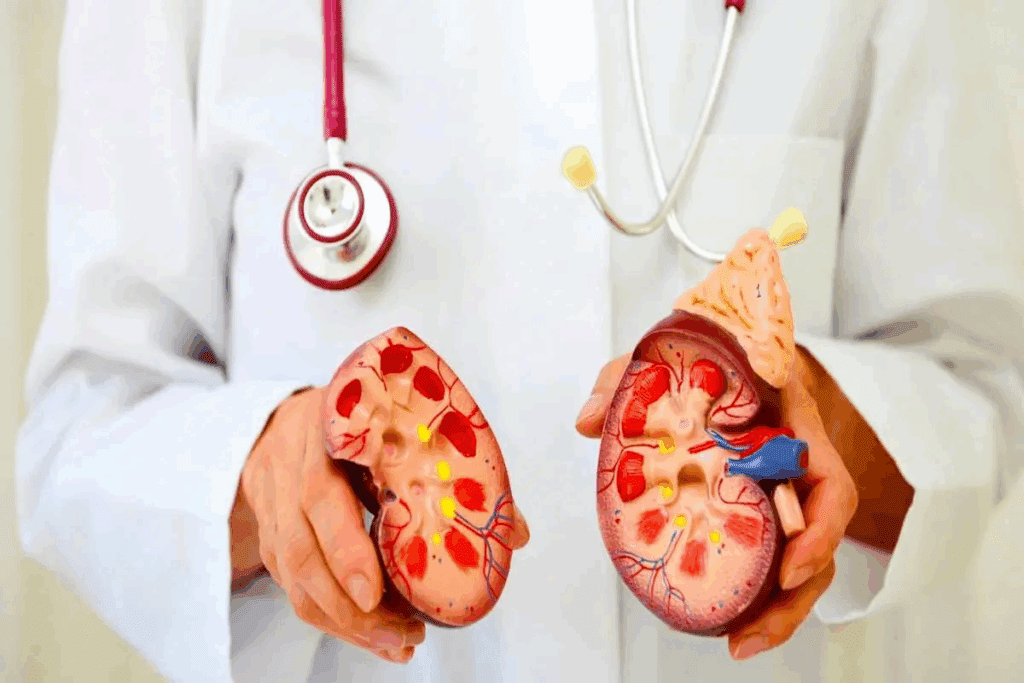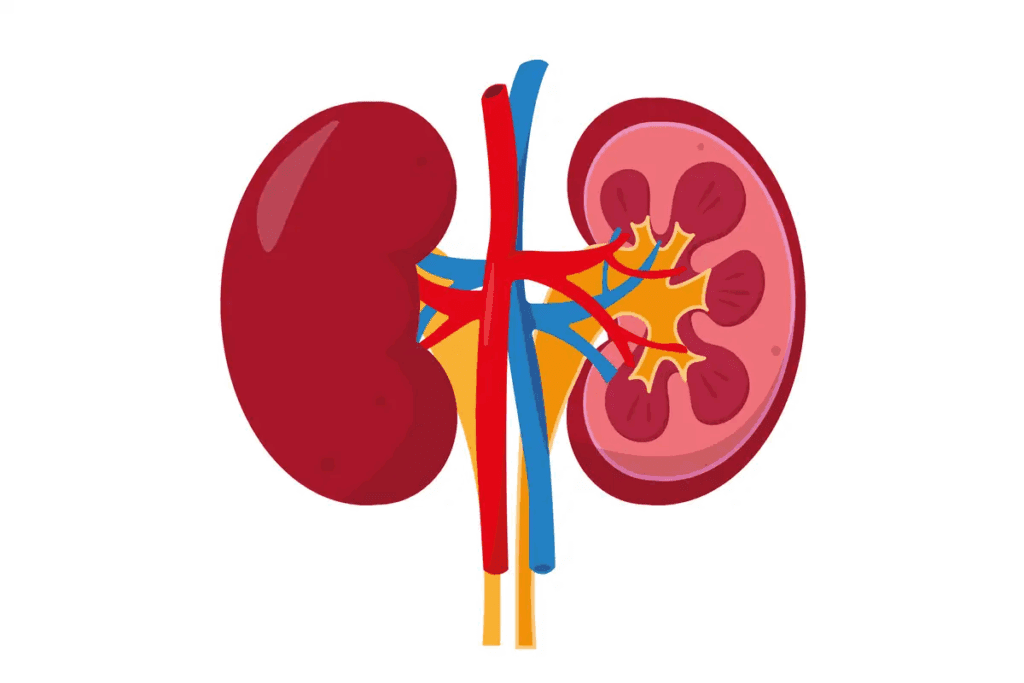Last Updated on October 31, 2025 by

When you find protein in urine in a test, it can worry you about your kidneys. Proteinuria, or too much protein in your urine, is a sign your kidneys might need help. Can protein in urine cause kidney stones? Learn about the relationship between proteinuria and an increased risk of stone formation.
At Liv Hospital, we help you understand what protein in urine means for your health. We focus on you, giving detailed tests and care to deal with this issue. We also look into how proteinuria might link to kidney stones.

Protein in urine, known as proteinuria, can signal health problems. It means too much protein is in the urine, often due to kidney damage or disease. We’ll look at what proteinuria is, normal vs. abnormal levels, and the types of proteins in urine.
Proteinuria, or albuminuria when it’s albumin, means too much protein in urine. Normally, kidneys filter waste and keep proteins. But, damaged kidneys can’t filter well, letting proteins into urine. Albumin in urine is a key sign of kidney trouble.
Albuminuria is often an early sign of kidney disease. But, finding albumin or other proteins in urine doesn’t always mean kidney disease. Other things can also cause proteinuria.
Normal urine protein levels are less than 150 mg/day. More than this is abnormal and might mean kidney damage or disease. The amount of protein in urine over 24 hours helps determine how severe it is.
Knowing these levels is key for diagnosing and managing kidney problems.
There are several proteins that can be in urine, including:
Knowing the type of protein in urine helps diagnose the cause of proteinuria.

Protein in urine can come from many sources. This includes short-term issues, kidney problems, and diseases affecting the whole body. Knowing what causes it helps figure out the problem and how to fix it.
Often, protein in urine is due to short-term or harmless reasons. These include:
Kidney diseases and conditions can also cause protein in urine. Some common ones are:
These conditions show how important kidney health is for avoiding protein in urine.
Systemic diseases can also lead to protein in urine. Some examples are:
| Cause | Description |
| Dehydration | Temporary condition that can cause proteinuria |
| Glomerulonephritis | Kidney inflammation leading to proteinuria |
| Diabetes | Can lead to diabetic nephropathy and proteinuria |
Understanding why there’s protein in urine is key to managing it. Whether it’s a short-term issue or a sign of a bigger problem, finding the cause is the first step to treating it.
Proteinuria, or too much protein in the urine, often doesn’t show symptoms early on. But, as it gets worse, you might notice signs and symptoms.
Many times, proteinuria doesn’t show symptoms at first. This is true in the early stages. Because of this, regular health checks are key to catching it.
As proteinuria gets worse, you might see some warning signs. These include:
These signs can mean there’s a problem with your kidneys or another health issue that needs a doctor’s attention.
Seek medical help if you notice any of these:
If you’re seeing these symptoms, it’s important to see a doctor. They can run tests to find out what’s wrong and suggest treatment.
To find out if there’s protein in the urine, doctors use different tests. These tests help figure out why someone might have kidney problems or other health issues.
Urinalysis, which includes dipstick testing, is a first step to check for protein in the urine. This test is easy and doesn’t hurt. It involves dipping a special strip into urine. The strip changes color if there’s protein, showing if there’s a problem.
But, this test isn’t always perfect. It can give wrong results if the urine is too thick or too thin.
A 24-hour urine collection is a better way to measure protein. You collect all your urine for 24 hours in a special container. Then, they measure how much protein is in it.
This test is great for seeing how bad the protein problem is and if treatments are working.
The protein-to-creatinine ratio is another useful test. It looks at the amount of protein compared to creatinine in one urine sample. Creatinine is a waste that doesn’t change much, making it a good reference for protein levels.
This test is easy and reliable. It helps guess how much protein is lost in 24 hours without needing to collect all the urine.
In short, finding protein in the urine involves several tests. By looking at the results of these tests, doctors can find and treat protein problems. This helps prevent bigger health issues.
Urine protein tests are key for diagnosing health issues. We’ll help you understand your results. These tests show how well your kidneys are working and your overall health.
A 2+ protein reading means you have a lot of protein in your urine. This could mean your kidneys are damaged or diseased. It’s very important to talk to a doctor about this.
A 30 mg/dL protein level is high and might show kidney damage or other health problems. It’s important to catch and treat these issues early. Your doctor will look at your whole health picture to understand this result.
Protein 20 in urine might mean early kidney damage or other health issues. It’s very important to talk to your doctor about what this means for you. They can help decide what steps to take next.
Understanding urine protein tests needs a deep look at your health and medical history. Working with your doctor helps you understand your results better. Together, you can figure out the best plan to handle any health problems.
When you see blood and protein in your urine, it’s a big warning sign. It means you might have a serious kidney or urinary tract problem. You should get help right away.
There are many reasons why you might see blood and protein in your urine. Kidney damage, infections, or diseases in the urinary tract can cause it. Here are some common reasons:
| Cause | Description |
| Kidney Disease | Conditions like glomerulonephritis can cause both blood and protein to appear in urine. |
| Urinary Tract Infections | Infections can lead to inflammation and damage, resulting in blood and protein in urine. |
| Kidney Stones | Stones can cause obstruction and damage, leading to the presence of blood and protein. |
Studies show that men and women have different reasons for blood and protein in their urine. Women are more likely to get urinary tract infections. Men might get kidney stones more often. Knowing these differences helps doctors find the right treatment.
Finding blood and protein in your urine is a big deal. It means you need a full check-up to find out why. Doctors might use tests like imaging, urine cultures, and kidney function tests. Treatment depends on what’s causing the problem, from antibiotics to more serious treatments.
If you keep seeing blood and protein in your urine, or if you have other bad symptoms, see a doctor fast. Don’t wait.
To understand if protein in urine can lead to kidney stones, we need to look at the latest research. Protein in the urine often means kidney damage or disease. Kidney stones, on the other hand, are hard deposits made of minerals and salts.
The connection between these two is complex. Proteinuria itself might not directly cause kidney stones. But, conditions that cause proteinuria can also lead to kidney stones.
Research shows the link between proteinuria and kidney stones is not simple. Yet, studies find that conditions causing proteinuria, like kidney damage, can raise the risk of kidney stones.
Many studies have looked into the connection between proteinuria and kidney stones. The evidence is not yet clear, but research suggests proteins in the urine might affect stone formation.
Some proteins can either stop or help minerals crystallize into stones. This knowledge could help find ways to prevent or treat stones.
Protein crystals in the urine are also important when looking at the link between proteinuria and kidney stones. These crystals can act as a starting point for stones or help existing stones grow.
We need more research to fully grasp how protein crystals play a role in stone development and their connection to proteinuria.
We will explore how kidney stones can cause proteinuria. We will look at the mechanisms behind this condition. Kidney stones can harm kidney function, causing protein to leak into the urine.
Kidney stones can block the urinary tract. This blockage increases pressure in the kidney. The high pressure can damage the kidney’s filtering parts, like the glomeruli.
This obstruction can also cause hydronephrosis. This is when the kidney swells from urine buildup. It can harm kidney function and lead to proteinuria.
Kidney stones can damage kidney tissues. As stones move, they can scratch the kidneys and ureters. This damage can cause scarring and inflammation, making it hard for the kidneys to filter waste.
The stones can also directly damage kidney tissues. This damage can disrupt the glomeruli’s function, causing proteinuria.
Kidney stones can trigger inflammation in the kidney. The stone can irritate the surrounding tissues, releasing chemical mediators. These responses can damage kidney tissues and impair their function.
Chronic inflammation from kidney stones can cause long-term damage. It can lead to persistent proteinuria. Managing inflammation is key to preventing further damage and reducing proteinuria.
Treating proteinuria involves lifestyle changes, medication, and managing health conditions. Our goal is to find and fix the cause of the problem. We aim to improve the patient’s health overall.
Making lifestyle changes is key in managing proteinuria. Dietary adjustments are often suggested, like eating less protein and sodium. Increasing physical activity and keeping a healthy weight also help.
Quitting smoking and drinking less alcohol are also important for kidney health.
Medications are used to treat proteinuria, often for conditions like hypertension or diabetes. Angiotensin-converting enzyme (ACE) inhibitors and angiotensin II receptor blockers (ARBs) are common. They help by lowering blood pressure and reducing protein in urine.
It’s vital to manage underlying health issues to treat proteinuria. This might mean controlling blood sugar for diabetics or managing blood pressure. For those with kidney disease, treatments aim to slow damage.
Seeing a nephrologist is often needed for persistent or severe proteinuria. This is true if there’s kidney damage or disease. A nephrologist can offer specialized care and treatment plans for better kidney health.
With a treatment plan that includes lifestyle changes, medication, and managing health conditions, patients can see big improvements. Their kidney health and overall well-being can greatly benefit.
To prevent proteinuria and kidney stones, we need a few key steps. These include changing our diet, staying hydrated, and keeping an eye on our health. By following these steps, we can lower our chances of getting these conditions.
Eating right is key to avoiding both proteinuria and kidney stones. Here are some important diet tips:
It’s also important to think about how much calcium we eat. The right amount of calcium can help prevent some stones, but too much can cause problems.
Drinking enough water is key to avoiding kidney stones. It helps make our urine less concentrated, which lowers the risk of stone formation. Drink lots of water every day. Aim for eight glasses, but it can vary based on how active you are, where you live, and your health.
Regular health checks are important for catching problems early. Here’s what you should do:
If you have a family history of kidney disease or are at higher risk, you might need to check more often.
Managing risk factors is key to avoiding both proteinuria and kidney stones. This means controlling blood pressure and diabetes through diet and exercise. Also, keep a healthy weight, exercise regularly, and don’t smoke to help your kidneys stay healthy.
By following these prevention tips, we can greatly reduce our risk of getting proteinuria and kidney stones. This helps keep our kidneys healthy and improves our overall well-being.
Understanding proteinuria and its link to kidney stones is key. We’ve looked at what proteinuria is, why it happens, how to find out, and how to treat it. We also explored how it relates to kidney stones.
Proteinuria means there’s too much protein in your urine. It can show kidney damage or disease. Kidney stones, hard deposits in the kidneys, can cause a lot of pain and problems. We found that proteinuria and kidney stones are closely related, with protein crystals playing a role in stone formation.
There are ways to prevent and treat both proteinuria and kidney stones. Changing your lifestyle, taking medicine, and managing other health issues can help. It’s also important to regularly check and screen for these conditions.
By spreading the word and ensuring proper diagnosis and treatment, we can help patients. This can lead to better outcomes and lower the risk of complications from proteinuria and kidney stones.
Protein in urine, or proteinuria, means there’s too much protein in your pee. Normally, your kidneys filter out waste and keep proteins. But if they’re damaged, proteins can leak into your urine.
Early on, proteinuria might not show symptoms. But as it gets worse, you might notice swelling, feel tired, or see foamy urine. If you notice anything odd or have been told you have proteinuria, see a doctor.
A 2+ on a urine dipstick test means you have a lot of protein in your urine. This could mean your kidneys are not working right. You’ll need to see a doctor to figure out why.
Yes, 30 mg/dL of protein in your urine is high. Normal levels are much lower. This could mean your kidneys are damaged. You should talk to a doctor about what it means for you.
Protein in urine itself doesn’t cause kidney stones. But some conditions that cause proteinuria can increase your risk. The link between proteinuria and kidney stones is complex.
High protein in urine can come from many things. It might be due to dehydration, intense exercise, or kidney diseases. Knowing the cause is key to treating it.
Doctors use tests like urinalysis and dipstick tests to find proteinuria. They might also do a 24-hour urine collection or a protein-to-creatinine ratio test. These help figure out how much protein is in your urine.
Treatment for proteinuria depends on why you have it. It might involve changing your diet, taking medicine, or managing other health issues. Sometimes, you’ll need to see a kidney specialist.
To prevent proteinuria and kidney stones, eat right, drink plenty of water, and get regular check-ups. Managing risk factors is also important.
Blood and protein in urine can mean many things, like kidney disease or infections. It’s important to get checked by a doctor to find out why.
Yes, kidney stones can cause proteinuria. This can happen through damage, blockages, or inflammation. It’s important to understand this connection to manage kidney stone patients well.
Subscribe to our e-newsletter to stay informed about the latest innovations in the world of health and exclusive offers!